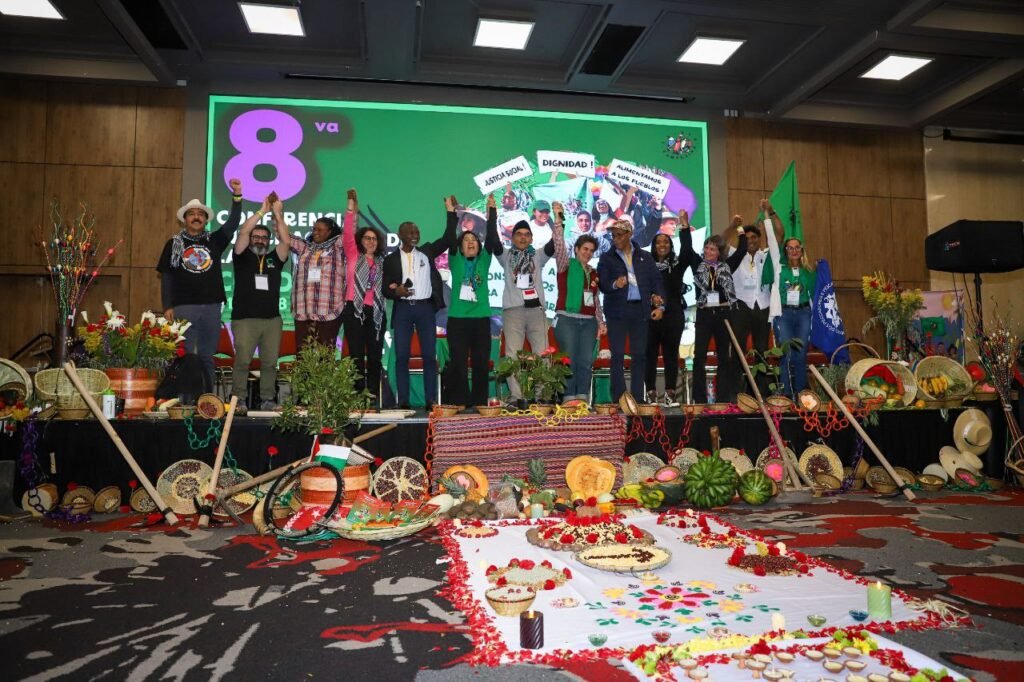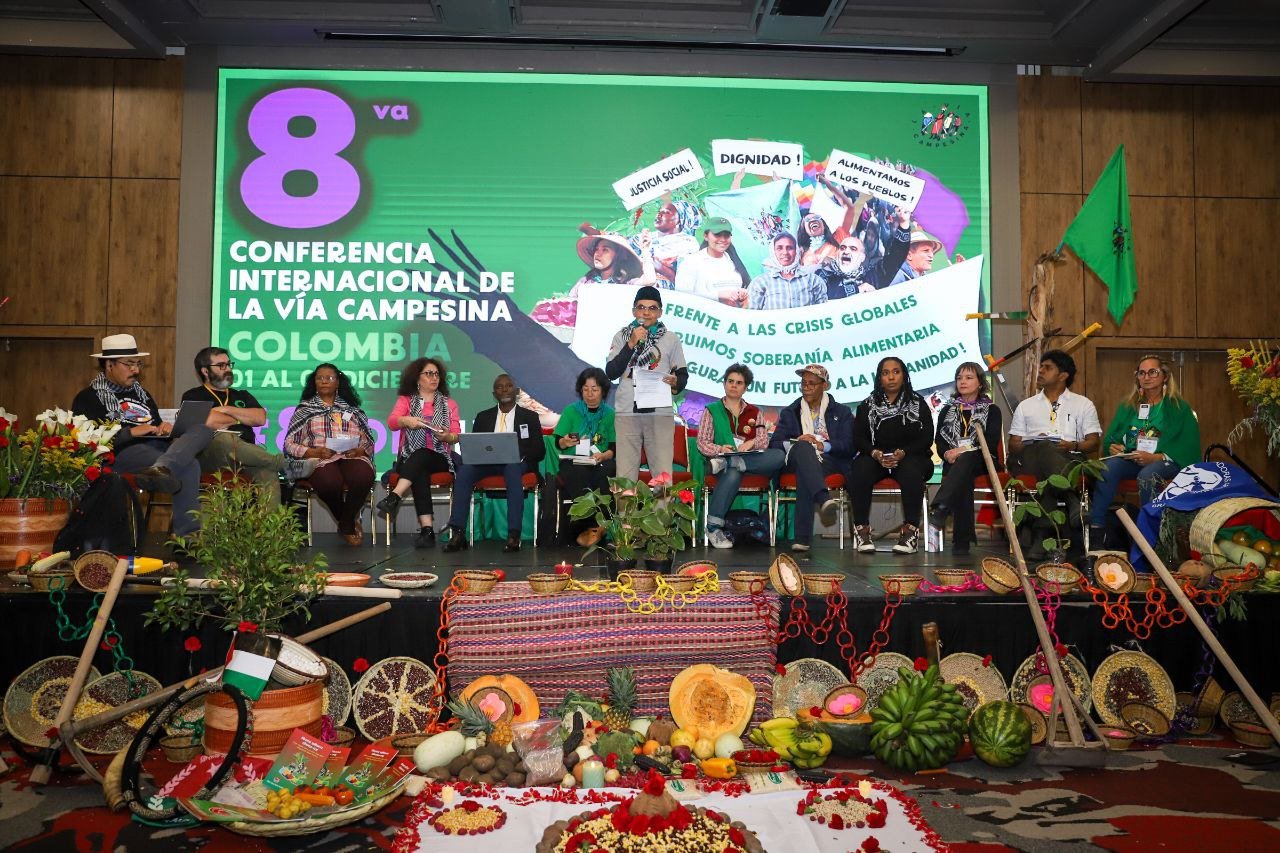Speakers in the morning sessions during Day 2 of the International Conference of La Via Campesina established that food sovereignty is, in the words of Ibrahima Coulibaly (Coordination Nationale des Organisations paysannes du Mali), “the mother of all the struggles we fight for,” encompassing, as Hatem Laouini (Million Rural Women and the Landless, Tunisia) put it, the struggle against occupation, the struggle for survival, the fight of small peasants, of women, and of the youth. In the afternoon, La Via Campesina’s allied organizations elaborated on this idea of food sovereignty as an encompassing struggle, explaining how the issues they take up and the battles they wage gain strength from the perspective provided by food sovereignty as a guiding principle and political horizon.
Yildiz Temirturkan, from the World March of Women, for instance, discussed how the organization’s alliance with Via Campesina has helped them advance their analysis of feminist politics and facilitated a serious consideration of what a feminist economy might look like, and the role that agroecology will play in bringing it about. Their struggle has since expanded from urban metropoles to rural areas, linking issues of feminism and class. This sentiment was echoed by Eulogia Juliana Familia, from Confederacion Sindical De Las Americas (Tuca-Csa), who underscored the need to talk about both productive and reproductive work, the latter of which has fallen on women, and which includes agricultural work performed by women. The struggle for food sovereignty, in her analysis, is simultaneously a feminist and a class struggle.
Margret Kwateng, from Grassroots Global Justice Alliance (GGJA), in the United States provided a lucid analysis of how the U.S. military and prison industrial complexes present fundamentally agroecological issues. She discussed the military’s war on human life and nature, its poisoning of the land, and the role of the prison in severing people’s connection with and control over food. Opposition to prisons, policing, and the military, therefore, must be central to the movement for food sovereignty. The forms of dispossession she described as structural to the United States are replicated globally. It is in this context that the speaker from the People’s Health Program emphasized the critical need for understanding seeds as a common inheritance, water as a common good, and for undertaking a struggle for the decommodification of land and food.
Several speakers addressed the interrelation of food sovereignty with a diversity of struggles, emphasizing the need for alliances with a broad range of movements, and a consistent clarification of their commonalities. The concept of food sovereignty, they suggested, provides a clear and far-sighted analysis of such commonalities. Such solidarity, care, and clarity in the movement is particularly important in this moment of multiple crises, as the speaker from Urgenci underscored.
Benny Kuruvilla of Focus on the Global South discussed the diminished power of the World Trade Organization in the architecture of international trade in the current moment—itself a victory of the work of movements such as La Via Campesina. The free trade regime, however, continues to pose a formidable obstacle to food sovereignty. What, he asked, would a trade system premised on food sovereignty look like? The creation of such an alternative trade initiative will require the sustained collaboration of a range of actors and movements for food sovereignty.
Martin Drago, from Friends of the Earth International (FoEI), emphasized the importance of a common analysis and programme that connects all the distinct struggles and visions represented by La Via Campesina’s members and allies. Such a well-defined and clearly articulated strategy would be of utmost importance for the durability and strength of the struggle. Paula from the International Planning Committee for Food Sovereignty also underscored the importance of broadening the struggle by identifying allies in a diverse range of grassroots movements that share La Via Campesina’s goal of systemic transformation. “The more diverse we are able to be,” she said, “the more impact we will have.”
In this vein, Josana Pinto, from the World Forum of Fisher Peoples (WFFP), discussed how any consideration of the food system, and any movement towards food sovereignty, must take seriously the increasingly threatened livelihoods of fisher peoples, who are providers of food and stewards of their territories. An issue of particular importance to fisherpeople is the right to territory, something that is also relevant to a host of communities, particularly forest dwellers.

The session closed with Saul Vicente, from the International Indigenous Treaty Council (IITC), who provided a historical overview of the movement for food sovereignty since 1996. He pointed out some of the movement’s important wins within the United Nations system. The Declaration of Nyéléni in particular was a pivotal moment, with the Food and Agriculture Organization itself adopting the movement’s definition of agroecology. La Via Campesina and Nyéléni have facilitated a shift in the policy discourse, from food security to the human right to food. Echoing Paula Gioia of La Via Campesina, who had brought up the many ways in which the food sovereignty movement has been appropriated, and who addressed the difficulty of maintaining a robust human rights framework, he discussed how the movement has been attacked from many directions, with the entire system of human rights under threat. With the increasing power of the right and heightened attacks on workers, women, and other groups, there is a sharpened need for solidarity in the struggle to bring about fundamental changes to the economic system. Food sovereignty, he reiterated, encapsulates all the struggles that we face in this conjuncture.

